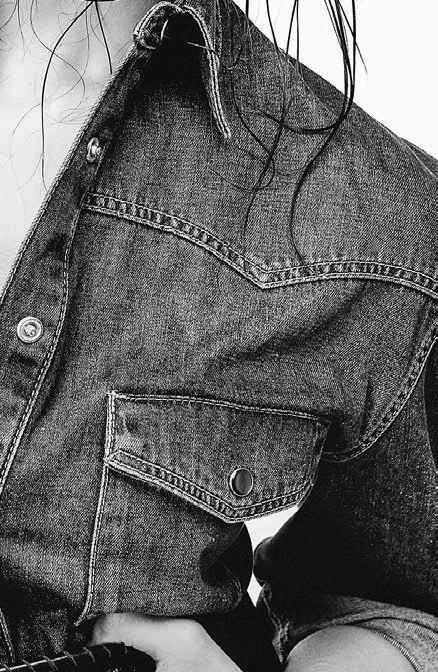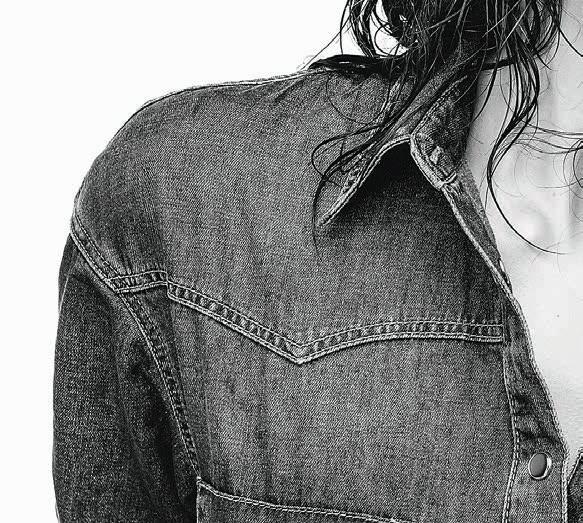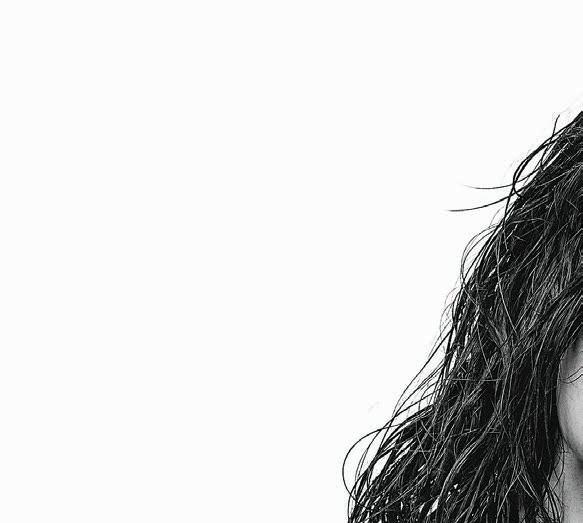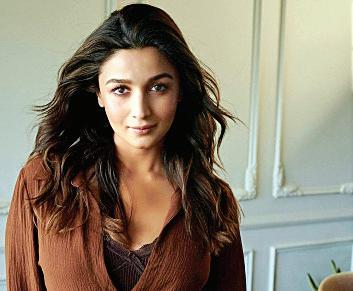
8 minute read
She finds the space between the words in the dialogue and makes magic.
Is there anything Alia Bhatt can’t do other than fly? She does it on screen. Last year - from her spitfire turn in Gangubai Kathiawadi to Darlings, to Brahmastra, the year’s been nothing short of terrific. She morphs in every scene like a chameleon. How does she do it ? Maybe there is some “source” in the ether from where she channels this changeling persona. In Darlings, she breaks your heart and gives you hope. She’s soft, she’s vulnerable, and she’s hard as nails. Dealing with the not-so-easily discussed topic of domestic abuse, Darlings is dark and funny, and full marks to the director who makes a moving and yet zany caper about those living life on the edge. At the heart of it all is Alia as Badru, ably supported by the sensational Shefali Shah, is there anything he can’t do-Vijay Varma and the dependable Roshan Mathew. With such razorsharp ensemble performances and a movie which made me think about why women go through what they do, I asked Alia Bhatt a few questions.
You turned producer with Darlings, despite the director, Jasmeet K. Reen, being a debutant. Is it your gut feeling which says this is the kind of lm you should produce? Jasmeet co-wrote it with Parveez Shaikh. The fact that she wrote the script and the fact that she wanted to direct it made me believe that she knew this world better than anyone else. I felt if anybody could do justice to the script, it would be her. There was also this gut feeling that she had the understanding and good sense because there was a certain texture and tonality that she had brought to Badru’s world. The script was so unique and surprising. Somebody gave me an opportunity when I was a nobody, and after having been in the industry for so many years, I also want to be able to support new talent. Instinctively, I felt that this would fit just right.
How did such a dark subject grip you? Did you think of sending it to Ranbir Kapoor or Karan Johar?
I never send my scripts to anybody, be it Ranbir or Karan. I always try to make the decision myself. When I wanted to produce Darlings, I took advice from my father, director Abhishek Varman, and Aman Gill, who is a producer and good friend. They all loved the script, so I asked if I should produce it. They all echoed the same reply: “Yes”. I have done a film like Udta Punjab, which was really dark, including my character. But Darlings tells a story of hope. There’s a positive message at the end. For me, that positive thing in the end matters.
You seem to shine under female directors, whether it’s Zoya Akhtar or Meghna Gulzar or Gauri Shinde. Is it because Jasmeet was a woman that she was able to understand domestic abuse better? What is it that separates female directors from males? If you are telling a story of a woman trying to find her feet in a man’s world, then I feel no one is better than a woman to tell that story. But you never know, a man could also have a very interesting gaze. I don’t think gender has a part to play. It’s your knowledge and understanding of the way people are treated. I can definitely say that there would have been no better person to direct Darlings than Jasmeet because she wrote it and created it. But I can’t say there’s no better person than a woman to understand violence against women. That wouldn’t be fair and a bit of a cliche. We don’t want men to be unfair to us, so why should we be unfair to them?
Your character Badru didn’t take enough of a stand against her husband...
If, as a viewer, you feel so strongly about Badru, it’s great. Basically, you just want to wake somebody up. Badru is an eternal optimist and assumes that it takes time for people to change and that things will eventually work out. She feels one should give people a chance, and she’s just brushing everything under the carpet.
You have a compatible relationship with all your screen mothers, whether it was in Gully Boy or whether it was Dear Zindagi and now Darlings. That’s true. In cases of domestic violence like in Darlings, usually the mothers would say ‘don’t leave, bear it’ and all of that. Here Shamshunissa (my mother in the film) says all the opposite things to me, which I find so beautiful because it’s honest, it’s real, it’s daring, and it’s what you need to hear in a situation like that.
Would you agree that the turning point in the lm was when you abuse Hamza and say “ladki thi”? And also the hospital scene. What was going on in your mind when you were doing those scenes?
In the hospital scene, you are just mourning and somehow coming to terms with it. In the scene where I abuse him, I am irritated that he’s bringing out this violent side of me. And becoming this person who wants to inflict pain on him. It’s something that she really does not want to do, but she’s doing it out of anger and vengeance. The wound is still raw. The subtext is that if he were to manipulate her, she could slip in that moment because her emotions were so raw. But she doesn’t.
You have an amazing chemistry with Shefali Shah in the lm… Individually we are all actors who have our own process of bringing our characters to life. Whether it was Shefali, Vijay Varma, or Roshan Mathew. It’s the director’s tone which brings you under one roof. We did our first reading and it was nice. But you never get a sense of a scene in a room with a script and a table. You have to be in costume, in character, on the set and in front of the camera to get real. I remember when going back home one day I was feeling extremely happy and satisfied with the day’s work. We had worked for 12 hours and I already felt like going back on the set. That is a good indication of work going well. But you never want to say it, you don’t want to jinx it. You just feel it and hope to feel it again and again.
Playing a character who is going through emotional and physical abuse must be very alien to you. As a privileged person, what kind of reference points did you have?




I didn’t have any reference points. People do ask me whether I met someone or spoke to someone. I don’t know, maybe I did, but no one was my reference point.
Okay, suppose there were friends who were going through emotional abuse and toxic relationships. What would be your instant reaction?
My instant advice to anybody would be to get out of a toxic relationship. But a lot of people don’t want to hear that advice. They need to reach that point themselves.
Was there a con ict between the privileged la-di-da actor and the money-counting producer?

Never! Because I am and will always be a creative person first. And I don’t understand money. That’s why I had Red Chillies with, and they handled that beautifully.
Heart Of Stone was your rst Hollywood project, and you were pregnant while lming with Gal Gadot (who was also pregnant while lming Wonder Woman). Were you intimidated or scared as you had to wrap up the schedule in one shot? The shooting took place as per schedule. They did have to change a few things around and pull up a lot of work to see that I was done by a certain date as I had to come back here. But the whole team was extremely accommodating. I was grateful because I was shooting my first action movie and also doing some stunts. They had doubles and I was made to feel very comfortable. And that’s all that matters, especially when you are doing it for the first time. When I called up Gal and told her that I was pregnant, she said, “Oh my God, that’s going to be amazing.” She had such a lovely reaction and said that it was a good omen for the movie. She and her husband were very supportive. Even Karan Johar was fantastic because I was in the middle of shooting for Rocky And Rani when I told him that I was pregnant. I was just back from a shoot and Karan was always like, ‘Alia, please watch your step, watch your step!’ Which he always did, but now he was doing it even more. Our production team had to deal with correct angles and all of that. Everybody has been so lovely, so excited and so supportive.

Marriage happened so quickly, and the baby also arrived quickly. Did you have the time to process all this? I don’t know if I had the time to process it, but it feels the same. There’s a different dynamic with so much more love and detail as we are no longer girlfriend and boyfriend and are going to be parents. There’s some new beautiful energy which I can’t explain. I feel like touching my head, touching wood, and everything around me.
Would you advocate living-in for everyone before getting married? Yes, if you can, why not? It’s great because you get used to each other, you get comfortable and you build so many memories without the pressure and baggage of being married. But each to his own.
With so much excitement and friends and relatives, what was going through your head when you were getting married? He proposed to me in January when we went for our holiday, and that was the time it started processing and changing. For me, it was like an exciting adventure coming ahead and nothing much to process.
When you marry into such a large family, does anything change? There was acceptance and warmth from the very beginning. We have been together for so many years now.
Looking at your mother, did you ever think what kind of a mom you would be?
My mum has been a great example of everything to me. I have zero complaints about the kind of mum she has been all my life. She’s a beautiful example and obviously you try to be as good, lovely and perfect as possible. But there’s no such thing as being a perfect parent. You just try to be as honest and as real as possible.
Coming to Brahmastra Part One : Shiva. It’s a macho lm, and you were obviously in a relationship with Ranbir when you were doing the lm. The relationship was happening behind the scenes, on the side and in the film. But at the end of the day, Ayan Mukerji’s vision was so much larger and there was so much at stake. There was a lot that we had to give, and that was all that mattered when we were working. Everything else took a backseat. Of course, there were moments like when Kesaria was playing and I would look at Ranbir and he would look at me. It’s great when you are romancing for real with the music playing in the background, which only happens in the movies. The whole experience of shooting for Brahmastra has been the best I have ever had in my life. The hope is that it all comes together.









